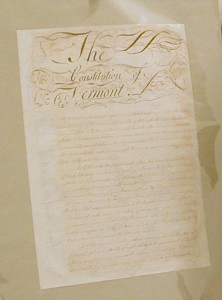It’s Chapter 1 of our constitution, the section called “A Declaration of the Rights of the Inhabitants of the State of Vermont,” where these broader protections are found. The “Declaration” pre-dates the federal Bill of Rights (the first 10 amendments added to the U.S. Constitution) by more than 20 years. It was modeled on (in fact, it was largely copied from) the “Declaration of Rights” in the first Pennsylvania constitution, adopted in 1776. The first Pennsylvania constitution is often considered the young country’s most democratic. Unfortunately (for Pennsylvanians) it was largely rewritten in 1790, while Vermont’s “Declaration” has basically remained unchanged since its adoption in 1777.
Among the greater protections in the Vermont Constitution:
• Search and seizure. Article 11 has been interpreted to require a warrant in more situations than the U.S. Constitution’s Fourth Amendment. For example, not only can your car not be searched without a warrant (true under the Fourth Amendment, too), but any closed container or area (like the glove box) is also protected against warrantless searches (not true under the Fourth Amendment). Also, you can’t be ordered out of your car during a roadside stop (unless you represent a physical threat or a crime is taking place within your car).
• Separation of church and state. Article 3 is much more detailed than the “establishment clause” of the First Amendment. Prayers before Vermont town meetings have been ruled unconstitutional based on the prohibitions against “compelled worship” in Article 3. The U.S. Supreme Court recently ruled that such prayers are permissible under the U.S. Constitution.
• Gun rights. Article 16 confers a specific individual right to bear arms (the question of whether the Second Amendment’s difficult syntax conferred such a right was argued for years). Article 16 succinctly states “That the people have a right to bear arms for the defense of themselves and the State….”
These protections aren’t just academic. As recently as this past June the greater protections of the Vermont Constitution were demonstrated when the Vermont Supreme Court overturned a mandatory DNA collection law. The legislature wanted anyone arraigned for a felony, not just those defendants convicted, to be forced to give a DNA sample. The Supreme Court said that went too far. Article 11 provides “heightened standards and requirements,” the court ruled. A warrant is needed to take someone’s DNA; the warrant requirement can’t be ignored simply because it’s easier for police and prosecutors to do so, the court said.
And in 2012, a Vermont Superior Court judge ordered the town of Franklin to stop beginning its annual meeting with a Christian prayer. Article 3 guarantees that “that no person ought to, or of right can be compelled to attend any religious worship,” the court said.
The rights asserted by the plaintiffs in both of these cases would likely not have prevailed under current courts’ interpretation of the U.S. Constitution. DNA can be collected without a warrant or the person’s consent, and prayers are allowed at public meetings, the U.S. Supreme Court has recently said.
Vermont Supreme Court Justice Thomas Hayes advised Vermonters 30 years ago, after the U.S. Supreme Court had begun a retreat from vigorous protection of personal rights, that Vermonters should turn to their own constitution for safeguards. In an opinion that received national attention, Hayes wrote in State v. Jewett that Vermonters’ own constitution could ''protect the rights and liberties of our people, however the philosophy of the United States Supreme Court may ebb and flow.''

